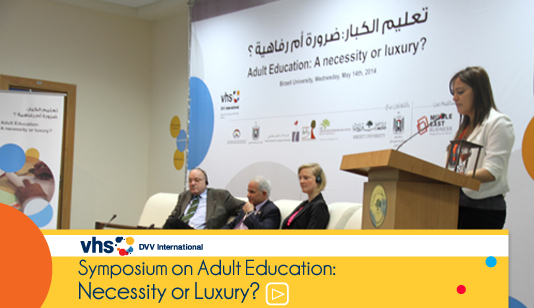Symposium on Adult Education: Necessity or Luxury?
By Saleh Yamani
DVV International held a symposium in May 2014 at Birzeit University, Palestine, entitled “Adult Education: Necessity or Luxury?”. The symposium was held in cooperation with Birzeit University, the Palestinian Ministry of Education, Ministry of Labour, Center of Continuing Education at Birzeit University, Juhoud for Community Rural Development, Tamer Institute for Community Education, Palestinian Central Bureau of Statistics, and the Federation of Palestinian Chambers of Commerce, Industry, and Agriculture. The symposium was managed by Middle East Business News and Magazine.
This seminar addressed the importance of adult education and aimed to raise the awareness about the definition of adult education, the age-groups involved, the process of adult education, its impact on the labour force, the labour market, and the importance of adult education as a strong pillar of sustainable development. Furthermore, the symposium shed light on adult education as a tool that contributes to qualifying individuals and developing skills in accordance with the needs of labour market, which results in the declining rate of unemployment and poverty.
The symposium also brought up the urgent need to build capacity within educational and training institutions in order to provide adult learners with better services and equip them with the skills that meet the needs of the labour market.
The symposium, launched by Ms. Amal Daraghmeh Al-Masri, Editor-in-Chief of Middle East Business Magazine and General Manager of Ougarit Group, began with questions about the definition of “adult education” and that it was DVV International for Adult Education’s aim to clarify this. Mrs Al-Masri highlighted adult education’s potential for reducing poverty and increasing employment rates. An example given was that there are 35,000 Palestinian graduates annually who are chasing a mere 5,000 jobs each year.
Mr. Jihad Zakarneh, Assistant Deputy and Head of Curriculum Development at the Ministry of Education, inaugurated the event. He addressed the work of the Ministry of Education on adult education strategies, which aim to create motivational environments for adult education in Palestine by defining the trends and methodologies that target the needs of individuals and labour market. Moreover, he pointed out that there is a need to structure a set of programs for adult education: improving literacy; professional, vocational and non-formal education; training education; self-education and others.
Ms Sabine Brickenkamp, Deputy Head of Development Cooperation at the Federal Republic of Germany’s Representative Office in Ramallah, spoke on a number of important issues: the function of awareness in adult education for socio-economic developments in Germany, welcoming the cooperative efforts between DVV International and the numerous Palestinian institutions for adult education in Palestine, and praising the collaborative relations between Germany and Palestine in several areas, especially sharing Germany’s successful experience in the field of adult education.
Dr. Anton Markmiller, Director of DVV International, talked about the vital role of DVV International for Adult Education in Palestine, emphasising the importance of adult education as a right, which is crucial to empower individuals’ awareness of their rights in their community.
Ms. Maha Smoom, DVV International Director in Palestine, said that adult education is more than encountering literacy; and it is not only applicable to the elderly only. Instead, it is an educational track for individuals who are 16 years old and above, or as she also referred to it as “life-long learning”, regardless of the kinds of education and training involved.
She added that adult education aims to improve the social and economic life of individuals and society, either directly or indirectly.
Ms. Smoom added that DVV International cooperated with the Ministry of Education in order to support and develop national strategies for adult education in Palestine that are in line with the realities and priorities of the Palestinian context.
Panel Speakers and their subjects
Ms. Katrin Denys, DVV International, Middle East Regional Director
“Terms and concepts of Adult Education”
Mr. Marwan Tarazi, Center for Continuing Education at Birzeit University
“Challenges and problems of Adult Education”
Mr. Khalil Rizq, Vice President of the Federation of Chambers of Commerce
“Readiness of the work force for the labour market”
Ms. Ghadeer Fannoun, Head of the Non-formal Education Department in the Ministry of Education
“National Adult Education strategy”
Mr. Mustafa Shala’ata, Co-director of Assassat for Organizational and Social Development
“Training of Trainers”
The symposium had an extremely experienced panel who discussed a wide range of subjects. Ms. Katrin Denys, of DVV International, argued that adult education is a significant tool which should be used to decrease poverty and unemployment. On the other hand, Mr. Marwan Tarazi explained the constraints facing adult education and about the importance of teaching methods. In addition, he underlined that without a clear framework we will be left with chaotic training programmes that will be unsustainable. He added, that Birzeit University, in line with its development plans, has established an Alumni and Career Services Office to help graduates find appropriate job opportunities.
Mr. Khalil Rizq explored the matter of adult education in the private sector, skills and compatibility of these skills with the requirements of the labour market. Ms. Ghadeer Fannoun provided examples of how to confront the barriers that impede training programmes, and how to incorporate adult education into Palestine’s national development plan. She elaborated that adult education was included in the national strategy for education for the next five years, which reflects a deep understanding on the part of the Ministry of Education of the importance of this sector. Finally, Mr. Mustafa Shala’ata spoke largely about the importance of psychological motivation in the adult education process. He highlighted the effects of inducements and how they can create an incentivised educational atmosphere for students.
At the end of two sessions, interventions were made by Tamer Institute for Community Education, the Ministry of Labour, and the Palestinian Central Bureau of Statistics. Tamer Institute shared their own success story involving 25 years of teaching, and their use of numerous tools to empower adult learners.
The second intervention was given by the Ministry of Labour’s representative, Samer Salameh, who spoke about the need for individuals’ qualifications to match those required by the labour market. The final intervention saw the Palestinian Central Bureau of Statistics’ representative, Maher Sbaih, commented on the importance of statistics and how they portray the reality of education in Palestine, and its benefit in strengthening the community’s qualifications.
In all cases, speakers and audience agreed that adult education is a necessity to bridge the gap that exists between the formal educational system and the labour market.
The symposium concluded with the following recommendations:
- Undertake research into labour market needs and the qualifications of the human resources.
- Define the strategies used in the adult education process.
- Achieve greater recognition for adult education.
- Create reliable and empowering learning environments.
- Develop an institutional accountability system.
- Assess the current training and education programmes.
- Reinforce the adult education strategy and its application.
- Increase opportunities in adult education for Palestinian women, thus integrating them further into Palestine’s economy.
UNESCO’s Definition of Adult Education:
“General or vocational education provided for adults after initial education and training for professional and/or personal purposes which aims to a) provide general education for adults in topics of particular interests to them (e.g. in open universities); b) provide compensatory learning in basic skills which individuals may not have acquired in their initial education or training (such as literacy, numeracy) and thus to; c) give access to qualifications not gained, for various reasons, in the initial education and training system; d) acquire, improve and update knowledge, skills or competencies in a specific field: thus use continuing education and training”.


























